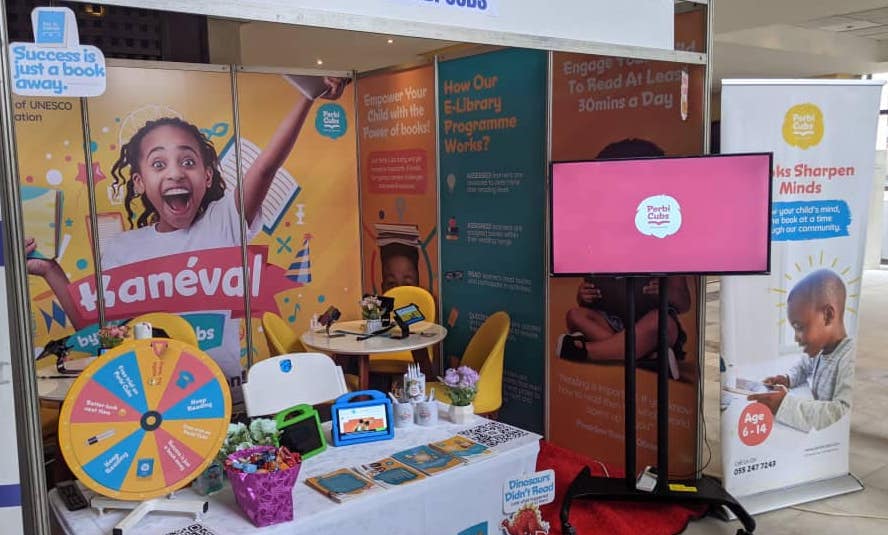
The Inadvertent Lid of Political Leadership: My One Regret and Heartache.
It’s been a very busy few weeks. The last one in particular was the kind that Nelson Mandela would call “‘impossible’ until it’s done.” The very morn of the dawn I arrived back in Accra from Kenya, the first day of the work week, I had to be speaking at about 10am at an African Young Professionals Conference. That same week my team at PELÉ and the Ghanaian contingent of the African-wide BCA Leadership hosted the power-packed, two-day Made in Africa Leadership Conference (MLC) from June 13 to 15. Then there was a Youth Rally in the vicinity of the University of Professional Studies (June 15 evening) where l was billed to speak as well. And then to crown that week, The HuD Group, which I founded with eight of my friends in 2003, held a press launch of our twentieth anniversary and simultaneous launch of three legacy projects.
In all of this business and busyness, one thing that has come through very clearly is that leadership is absolutely important–that everything does rises and falls on leadership. I tried to make that point in my opening remarks to the distinguished ladies and gentlemen convened at the Marriot for the aforementioned MLC 2023. Even this morning, as I was training the executive team of one of our PELÉ clients, a tech start-up, Maxwell’s Law of the Lid came to the fore: leadership is the lid on their personal level of effectiveness as well as the organization’s impact that it would ever make.
Leadership is so important that every professional must have it, everyone in every sector of the economy must possess it, and everyone at every level of society must have it but especially leadership is too important to leave it to politicians alone. “Leadership is cause,” as one other leadership expert puts it, “everything else is effect.”
As we celebrate 20 years of The HuD Group, we can testify that God has done amazing things in, on, with and through The HuD Group. We started in Ghana, moved to Cote D’Ivoire, then to Nigeria and Canada and now have a presence in 24-25 countries on all continents, having incredible impact on people in every sphere. In fact, at the anniversary launch last week Friday, several VIPs like celebrated, young, award-winning journalist Manasseh Azure Awuni, shared how The HuD Group had impacted them. But I shared with the audience my one regret: that in all this 20 years of The HuD Group we did not give enough attention to the political space in particular. Of course, it is not that we did nothing at all but knowing what l know now and seeing how successes in all these other areas of life have literally been eroded by what has happened in the political space, especially in Ghana, that really breaks my heart.
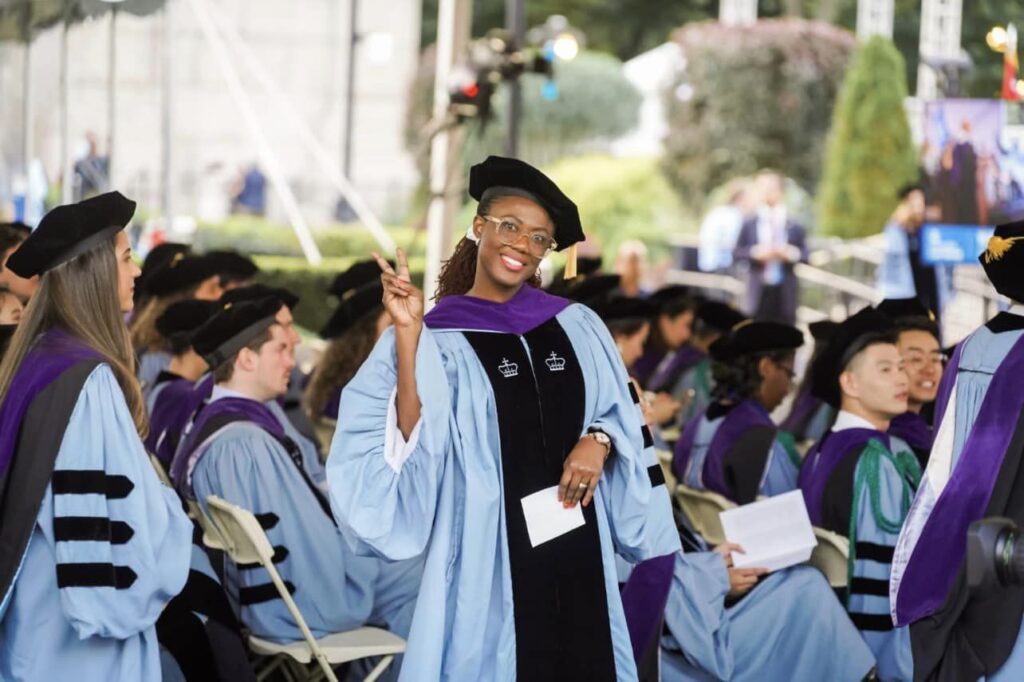
This brilliant friend just graduated from Columbia Law School. I told her I was going to share this beautiful photo on social media as it illustrates my frustration that a lioness like her will be returning home to Ghana only to be led by goats.
THE SKY ISN’T THE LIMIT; POLITICIANS ARE
This has been a season of lots of graduations. I’ve seen flashy photos from Harvard to Fuller, and been physically present at inspiring commencements like Ashesi’s about three weeks ago. First, I’ve been excited about all these amazing graduates bustling with energy and vision and drive, some having done some earthshaking capstone projects and all. Yet all these amazing people formally graduated by our best academic establishments and semi-formally by The HuD Group in the last 20 years—and yes, some of us have been though all kinds of fellowships from Aspen and Eisenhower to Tutu—are restricted by what happens in the political space because everything rises and falls on that leadership. Political leadership is the lid over all our collective effectiveness and greatness.
If anyone told these graduands that the sky is the limit, that isn’t wholly true; our political leaders are. No I’m not a whiner; I am precisely the opposite of that, which is why I’m a serial entrepreneur. So I believe in creative ways around ‘the system’ but as the august chairperson of the HuD anniversary launch, Madam Yawa Hanson-Quao, had earlier said at the MLC, “We cannot entrepreneur our way out of bad governance.” Political leadership is the lid over all our other attempts at leadership.
Political leadership is the lid over all of our collective effectiveness and greatness in all of our fields of work and spheres of influence. We’ve got to get up and take the political space seriously and not let anyone who is not a selfless, authentic, transformational leader make their way there! Because then, it doesn’t matter how the collective brilliance of all of us is, there would be a lid over the rest of us. A good illustration is the proverbial army of sheep led by a lion versus or an army of lions led by a sheep.
At the end of the day, every sector, and every level of our society needs at least good leaders, even better, great leaders! Otherwise like John Gardener aptly puts it, “The society which scorns excellence in plumbing as a humble activity and tolerates shoddiness in philosophy [or politics for that matter] because it is an exalted activity will have neither good plumbing nor good philosophy: neither its pipes nor its theories will hold water.”

Confluence for Influence: Kanéval by Perbi Cubs Leverages UNESCO’s Accra World Book Capital 2023.
Exciting news! Perbi Cubs Library Services is teaming up with the United Nations Educational, Scientific and Cultural Organization (UNESCO) and the Ghana Book Development Council, among others, to celebrate Accra World Book Capital (AWBC ’23) as official partners. Accra, the capital city of Ghana, in West Africa, is the 23rd city in the world, and only the fourth in Africa, to have the honour of this title which UNESCO initiated in 2001 to promote literacy globally. This is akin to a literacy World Cup title, only it is bestowed annually.
The World Book Capital is an initiative of UNESCO which recognizes cities for promoting books and fostering reading for a year, starting on April 23, World Book and Copyright Day. UNESCO adopted the 31 C/Resolution 29, in 2001, establishing the World Book Capital (WBC) programme. Cities designated as UNESCO World Book Capital pledge to carry out activities with the aim of encouraging a culture of reading and diffusing the values of literacy, lifelong learning, copyright, and freedom of expression in all ages and population groups, both within and beyond national borders. The first city to be awarded was Spain in 2001 and Accra’s turn is sandwiched between Guadalajara, Mexico (2022) and Strasbourg, France (2024).
The UNESCO World Book Capital Advisory Committee, which evaluates bids to win the title, comprises representatives of the International Publishers Association (IPA), the International Federation of Library Associations (IFLA), the International Authors Forum (IAF) and UNESCO. Past capitals include Madrid (2001), Alexandria (2002), New Delhi (2003), Anvers (2004), Montreal (2005), Turin (2006), Bogota (2007), Amsterdam (2008), Beirut (2009), Ljubljana (2010), Buenos Aires (2011), Erevan (2012), Bangkok (2013), Port Harcourt (2014), Incheon (2015), Wroclaw (2016), Conakry (2017), Athens (2018), Sharjah, (2019), Kuala Lumpur (2020) and Tbilisi (2021).
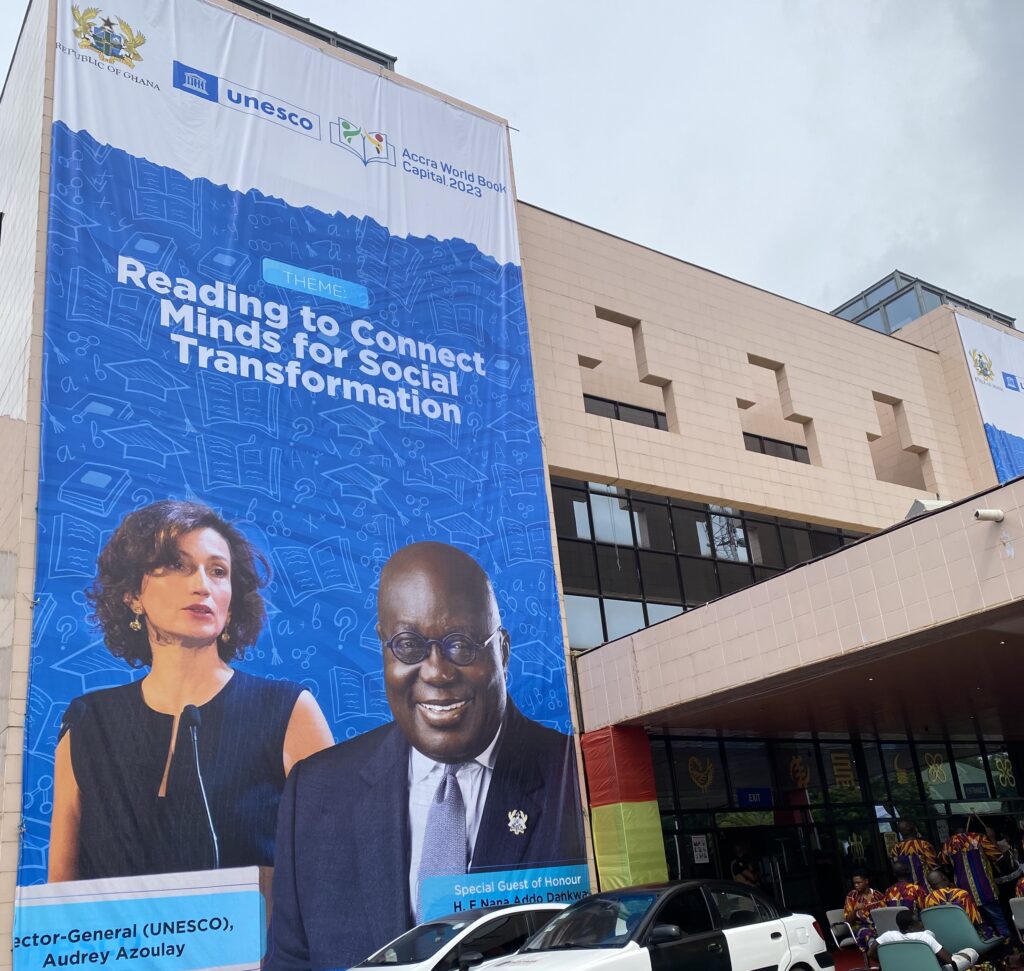
The grand opening ceremony of Accra World Book Capital at the Accra International Centre by the President of the Republic of Ghana
THE GHANA JOURNEY
Accra’s first attempt to win the 2019 World Book Capital title, after the idea was mooted in 2016 and working towards that, failed. Accra relaunched the bid in April 2021 and won it. The executive board of UNESCO, at its 215th session in Paris, France, on September 22, 2021, named Accra the World Book Capital 2023, following evaluation by the World Book Capital Advisory Committee. This was no mean achievement for the ten-member bidding team representing the Accra Metropolitan Assembly, Ghana Commission for UNESCO, Ghana Library Association, Ghana Publishers Association, Complementary Education Agency (formerly Non-Formal Education Division), Ghana Association of Writers, and the Ministry of Foreign Affairs and Regional Integration and chaired by Mrs Ernesticia Lartey Asuinura, the Executive Director of the Ghana Book Development Council (GBDC). Several internal staff of GBDC were behind this successful bid and must be applauded.
According to UNESCO, “the city of Accra was selected for its strong focus on young people and their potential to contribute to the culture and wealth of Ghana. Accra’s proposed programme seeks to use the power of books to engage these young people, as an effective way of skilling up the next generation.” Earlier this year, on April 11, the Minister of Education of Ghana, Dr. Yaw Adutwum, held a press launch of AWBC’23 at which Perbi Cubs was represented by the Founder and CEO, Mrs. Anyele Perbi. He explained that Accra was selected ahead of other cities because the Education Ministry’s programmatic focus was on young people and their ability to contribute to the culture and wealth of Ghana through the power of reading. “Research shows that reading improves the learning outcomes of students in schools,’ said the Minister. “That’s why in certain schools around the world, they’ve implemented and employed the ‘Drop Everything And Read’ – ‘DEAR’. So if it’s 15 minutes, 20 minutes a day, children are made to stop everything and read,” he illustrated.
Dr. Yaw Perbi, Global CEO of The HuD Group and Co-Founder of Perbi Cubs, and Mrs. Anyele Perbi , Founder and CEO of Perbi Cubs, were invited and did attend the grand opening of AWBC ’23 by the President of the Republic of Ghana, Nana Addo Dankwa Akufo-Addo, and the Director-General of UNESCO, Madam Audrey Azoulay Ayoub, at the Accra International Conference Centre. The theme for the occasion was ‘Reading to connect minds for Social Transformation’. It was encouraging interacting with school children as well as top academics at the Perbi Cubs booth, including members of the Ghana Academy of Arts and Sciences. Visiting the exhibition booths of other players in the literacy space was also invigorating but nothing beat the joy of seeing the attending school children flock to the Perbi Cubs stand to sample for a few minutes the thousands of books on their online platform.

Several groups of school children practicalized the whole point of AWBC by doing actual reading at the launch
Under the theme ‘Reading to connect minds for social transformation’ the programmes planned for the title year will focus on particularly the youth and vulnerable groups in Accra (and Ghana at large) such as children, underemployed women, head-porters (kayayei) and persons living with disability, to equip them with literacy and employable skills, while promoting the rich Ghanaian cultural heritage and the book industry in Ghana.
THE PERBI JOURNEY
Both Yaw and Anyele Perbi (née Ampa-Sowa) come from homes full of books. In fact, they got to know each other as children of professors at the University of Ghana campus. Anyele’s dad was an Economics lecturer and Yaw’s mum, a history lecturer. In their growing up years Yaw’s own dad, being a long-time member of the board of Challenge Bookshop, would receive loads of books every year, feeding their home library fat.
Tracing the history of books even further, Yaw’s maternal grandfather was not only an author and professor of African Studies and Ethnomusicology at the same university, but also together with writer and educator Dr. Efua Sutherland organized the first international book fair in Ghana in the early 1970s and proceeded to come together to found Afram Publications a couple of years later, incorporating it in February 1973. Emeritus Professor J.H. Kwabena Nketia was his name.
The Perbi household buzzed with books and moments like when the floating bookshops, the MV Doulos or Logos ships, would berth at the Tema Harbour were fun galore. Meanwhile, Yaw did not like reading as much as Anyele in their early years on the Legon campus. Anyele LOVED reading to the point that the rate of buying books for her and her two brothers was threatening to bankrupt her parents. When she was missing from the house you could be sure she was immersed in a book somewhere!
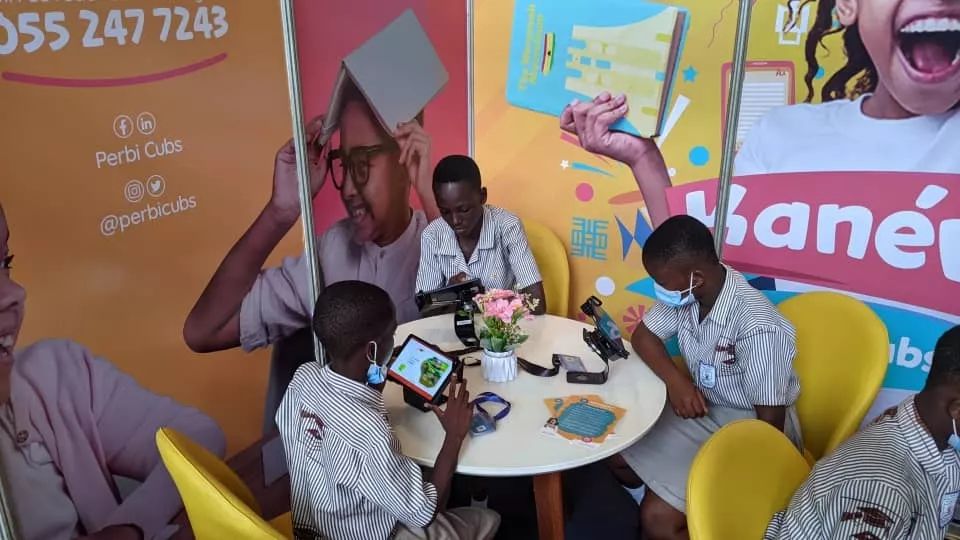
At the intersection of age old reading and new technologies stands Perbi Cubs’ online digital reading platform and offerings
Two jerking statements changed Yaw’s attitude towards books. The first was, “If you want to hide something from a Black people, put it in the book.” You may read the full story here. Fascinatingly, by the age of twenty-three, Yaw would write and publish his first book, What Every Fresher Should Know about University, and as an internationally-recognized author of some twenty books and several book chapters, journal articles etc. now, as they say, the rest is history. Today, one of his punchy books called Read! is subtitled: “You are ‘illiterate’ if you can read but don’t.” Dr. Perbi’s 2015 Thinking Outside the Window was even an Amazon bestseller in its category. His latest book, co-authored with a Kenyan and published in March 2023, is entitled Africa to the Rest. In it, Yaw stresses the need for Africans not only to read but also to write. “Until the lion learns to write,” he reminds us, quoting an old African wise saying, “every tale of the hunt will glorify the hunter.”
When Yaw founded The HuD Group in 2003, one of its first divisions was a library called The Mine (it still runs at the Staff Village of the University of Ghana). So for at least two decades now, Dr. Perbi has been a fierce reading campaigner. And now in tandem with the erudite Anyele, he likes to say “my wife and I have stepped up by stepping down.” What he means by that is, they’ve enhanced their reading campaign (stepped up) but decided to go further down to the age where humans are most pliable: childhood (stepping down). And they began with their our own seven children in the French city of Montreal, Canada which happens to have been the UNESCO World Book Capital in 2005, four years before they would dwell there as a family for the next dozen years. Their own children’s love for reading, the generous 40 books per person supply of the Pierrefonds municipal library across the street from their West Island home and an imminent eight-month visit to Ghana that threatened to stifle this Perbi reading culture combined to birth the Perbi Cubs Library Services. You may find the story and philosophy behind Perbi Cubs here.
AND NOW, KANÉVAL
According to Perbi Cubs CEO, “We are excited to inform you that Perbi Cubs, in partnership with UNESCO Accra World Book Capital 2023, will be organizing a fantastic year-long program. Watch out for Kanéval as it moves round throughout the year, to your school or community. Stay tuned on the various Perbi Cubs social media handles like Facebook, Twitter, LinkedIn and Instagram for more updates.” Kanéval by Perbi Cubs, a season of fun, inspiration, and BOOKS, is launching in Accra on May 11, 2023.
As long as reading remains a chore, we’ll have a problem promoting it. But who doesn’t love a good festival, a carnival? What if we could think outside the box and bring together the idea of a traveling amusement show with merrymaking sideshows, rides, etc. with reading? What if face-painting or getting on a swing was a reward for reading a book? These are some of the disruptive ideas that incubated and eventually hatched Kanéval. The idea of Perbi Cubs in general and KANÉVAL in particular, is to bring FUN to reading while strongly brandishing the connection between reading and success in life.
In the spirit of innovation and creativity, Perbi Cubs values, the coined word Kanéval was inspired by the word for read in Ga, the language of the Accra people, Kané. So combining ‘Kané’ with the English word ‘carnival,’ here we are! There will be lots of fun, reading and other educational activities. Perbi Cubs is grateful to several Ghanaian influencers like Nana Aba Anamoah (media personality and General Manager of GHOne TV and Starr FM), Bernard Avle (Citi Breakfast Show host and General Manager of Citi FM), Kafui Dei (author, speaker and GTV Breakfast host), Portia Gabor (TV3 hostess and Ghana Journalist Association’s reigning Journalist of the Year), Gwen Addo (entrepreneur, author and CEO, The Hair Senta), Giovani Caleb (media personality, radio and TV), Gifty Anti (author, media personality, celebrated journalist) and others who are synergizing with them to take the culture of reading to the next level to transform the fortunes of Ghana and Africa.
Perbi Cubs’ Kanéval is scheduled to take off on 11th May, 2023 at Alpha Beta Education Centres and then to all their partner schools and other communities, particularly deprived ones badly needing a literacy intervention. Kanéval is not just for our Cubs but all our stakeholders including you. There are many activities you can join in with exciting prizes. Kanéval awaits you for a Kanévalistic experience. Kanéval – Reading is fun!!! The amazing part is that in collaboration with various partners, Perbi Cubs is offering huge discounts on their subscriptions so that every Cub in their partner schools can read this year!
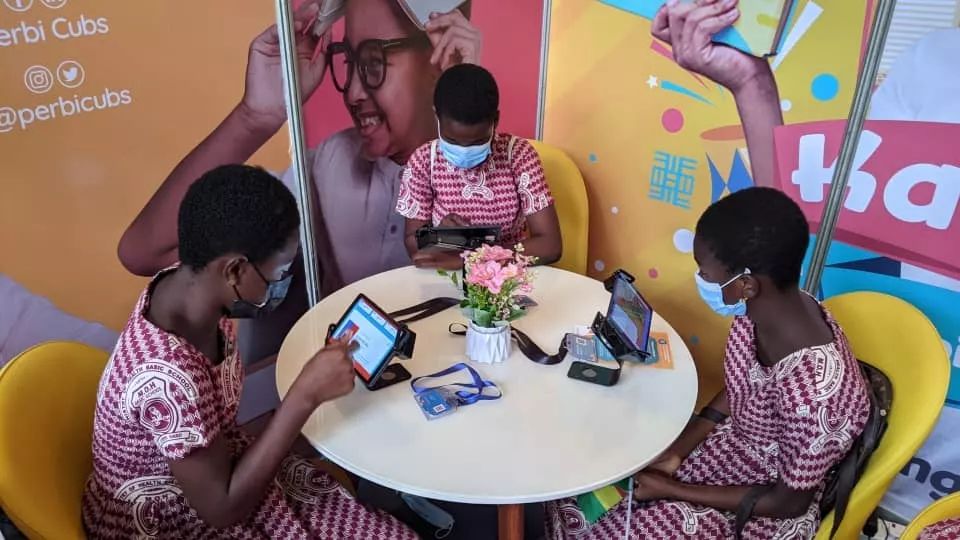
Perbi Cubs has served about 10,000 children so far and is set to scale that in this AWBC year to 100,000
WE HAVE A PROBLEM
Kanéval is fun about something serious. And Ghana in particular has a problem that isn’t funny. As a society we do not value reading enough. If research has proven that the love for reading is a stronger indicator of a child’s success in school and prosperity in life than even their parents’ socioeconomic status or level of education, then we should be worried that only 6% of Ghanaian children at classes two and three can read and understand what they read (UNESCO 2021). Meanwhile the World Book Capital Network (WBCN) acknowledges and reminds us of the power of books and reading as cornerstones to more inclusive, peaceful and sustainable societies. Thus as they rightly put it at Perbi Cubs, “Success is just a book away,” be it personal or national.
Let this be the year we all got dead serious about raising the tide (the general level of literacy) that lifts all the other boats, all sectors and subjects, including STEM. O that the confluence for influence between Kanéval by Perbi Cubs, influencers like those cited above and all other players in the UNESCO’s Accra World Book Capital 2023 space will do the trick. Let’s get on with this serious business, having fun along the way. Kanéval it is!
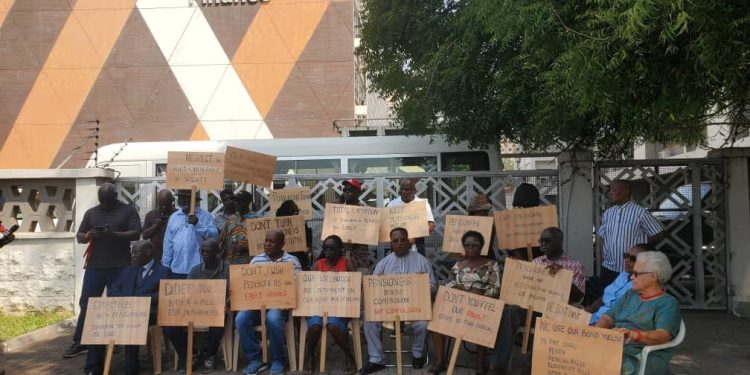
FROM PROFESSOR TO PICKETER: The Lost Generation and the Missing Money
Ghana is neither worth living for nor dying for. That’s how many feel at the moment. Honestly. Think about this: I’ve known Uncle Kweku since his graduate student days on the University of Ghana campus. I was only a lad then. He would later complete his graduate studies, an MPhil in linguistics, and top it up with a PhD from Oregon, USA.
After an illustrious career as an academic (see his brief bio here on the University of Ghana website) he not only retired as a full professor but even served as Pro Vice-Chancellor of Ghana’s premier university. What do we find the illustrious son of Ghana doing these days? Picketing on the premises of Ghana’s Ministry of Finance to demand that the government exempts his and fellow pensioners’ bonds from being sequestered in the dubious Domestic Debt Exchange (DDE) programme. I know for a fact that virtually all of Prof. Kweku Osam’s pension monies are in these bonds. Ei! A former Chief Justice also picketing alongside the other day is reported to have said, “I am over 70 years now. I am no longer government employed, my mouth has been unguarded, and I am talking, and I am saying that we have failed.”
“BACK TO THE FUTURE”
When Uncle Kweku overtly verbalized to the media in an interview on one of the picketing days that he would dissuade his children from ever investing in the Government of Ghana’s financial instruments because “they are risky,” he seemed to have read my mind. Seriously. For while I agree that it is despicable to draw the aged into this DDE debacle and punish pensioners who have planned well for their future and lent their own monies to government to work with, I have an even greater concern for the young people of the country who might take decades to recover from this rude shock. It has taken years to grow a savings and investment culture in Ghana.
As previously started in an earlier article on this matter, “I am pained that, ‘The fathers have eaten sour grapes, and the children’s teeth are set on edge’ (Ezekiel 18:2). For over 20 years now, The HuD Group and I have championed a culture of savings and investments in Ghana, and had the JOY of seeing thousands heeding the call, especially young people.” I recently met one of the young men I used to travel the country with to inspire and teach young people to form investment clubs and start investing. He’s currently the managing director of a major investment company in Ghana. He intimated how this whole DDE disaster made him shed several kilograms over a month, being at the receiving end of verbal and other forms of abuse from frustrated and fearful investors. At the time we spoke, people were withdrawing an average of 100 million Ghana Cedis each day from his outfit. He had already dispatched 2.5 billion Ghana Cedis when we held our conversation.
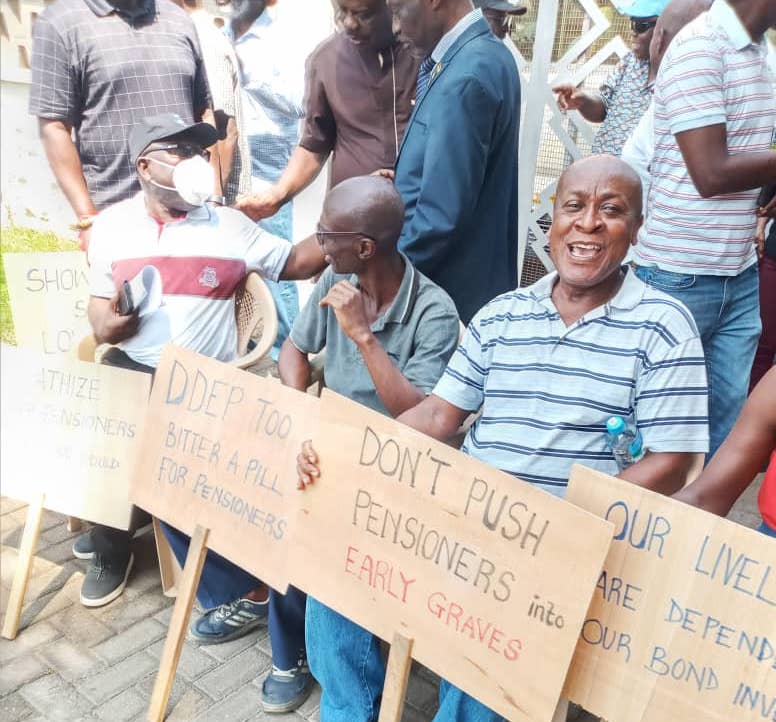
A zoom in on Prof. Kweku Osam, picketing at the Ministry of Finance, with his fellow pension bondholders
BACK TO THE PENSIONERS
So what exactly are we working for? The calibre of pensioners-turned-picketers is disheartening: doctors, engineers, civil servants… If retired professors and chief justices are protesting, what about the no-namers and the many who are too old or too ill to hit the streets? I am privy to a WhatsApp message Prof. Kweku Osam sent that was meant to be just informational, but ended up being very transformational for me:
The last time I took part in a public demonstration against a government of Ghana was in May 1983, as a fresh graduate student. That was when students in the country rose up against Rawlings and his PNDC. Today, God willing, I’ll join fellow Pensioner Bondholders to protest at the Ministry of Finance. The government should leave Pensioner Bondholders alone. Touch not the Pensioner Bondholders.
Think about it: Uncle Kweku began his working life protesting the government. Forty years later, he is ending his working life with yet another anti-government protest. Virtually all his lifesavings is now being held at ransom by a government that has misled and mismanaged her affairs, Covid-19 and Russia-Ukraine notwithstanding. After forty years of wandering in the wilderness between the 1983 protest and the present one on the eve of our sixty-sixth independence commemoration, Ghana itself is a pensioner by age, without much to show for it. We’ve got to do better for our people, old and young alike. Seriously.
Prof. Osam’s generation–my parents’ generation–is the same one the current Finance Minister, Uncle Ken, belongs to. It is the same crop of people who plotted military coup d’etats a generation ago in their youth. Now they won’t exit quietly either, not without a financial coup de grace. With trepidation, dare I call them the lost generation? And they did not only lose themselves and their way, they lost money–theirs and ours.
But to what will my generation and those following rise, having clearly observed that Ghana is not worth living for and Ghana is not worth dying for? That’s how many feel at the moment. Honestly. Think about it.

On Saving a Nation.
The story is told of a man who traveled from a developing country to a more economically advanced one in search of a better life. Upon arrival, the man was shocked to find that no one managed the local milk shop. Customers would take what they needed from the refrigerator, leave the exact amount of money for their purchase, and be on their way. Neither the milk nor the money was under lock and key. This would never happen in my country, he thought.
The only thing that surprised the man more than the honor system of the unmanned milk dispensary was the price of the product. The milk was cheaper here, even though his country had more milking cows than people—and in turn produced more milk. How could this be? Then it finally hit him. The higher price at home included the additional costs of dishonesty and thievery.
In his country, locks would be purchased for the refrigerator and money box. A worker would be hired to conduct the transactions. Another person or two would be hired as security, in addition to needing expensive CCTV cameras. This is not to mention the added logistical and utility costs from inefficient or unreliable systems. It all adds up, reflected in the price of a single bottle of milk.
What the society of the man’s home country lacked in cultural values, it paid dearly in economic value—in other words, a higher cost of living than a country with a higher standard of living.
The commercial cost of values
What makes a nation great and strong, ultimately, is its people and their values. Societal values determine what people consider good or important, and this informs how they act. If we consider present-day Ghana in this context, we are likely to be disappointed.
Money and material possessions. Greed and selfishness. These values permeate our society. So I thought it wise to speak to the issue of values in terms of commercial costs. My hope is that even those who place money and materialism and personal gain above all else—including the common societal values espoused in our national anthem and pledge—will realize that real values, such as service and integrity, still affect their bottom line. They will make more money with them, than without.
Consider that Warren Buffet, one of the world’s richest men and most successful investors, advises leaders to look for three things when assessing job candidates: intelligence, initiative, and integrity—but to weigh integrity above all else. If a worker lacks the latter trait, Buffet says, “the first two will kill you. Because if you’re going to get someone without integrity, you want them lazy and dumb.”
It is with near-total trust that we poke an opaque tin of milk and pour out its content without a second thought. We’ve got to trust the regulator, trust the manufacturer, and trust the entire supply chain. A friend and former senior manager in a company that produces perishables once told me that the company would destroy whole batches of product at the slightest hint of compromised quality, because the negative cost of their brand being brought into disrepute would be much greater in the long run than the temporary loss of the thousands of dollars flushed down the drain by an honest act.
Values at the core of a nation
Little drops of values at the individual, family, organization, and sector levels of a society eventually coalesce to make a mighty nation. This is how I have long thought of Ghana. As a mighty nation, rich in social and cultural values to emulate.
I grew up in the early 1990s, when neighboring countries like Liberia and Sierra Leone were decimated by war. Hordes of refugees made their way into Ghana. As a World Vision Youth Ambassador, I toured refugee sites in the country with donors, and the tentative nature of life in tents made me tear up. I have always been grateful to God that Ghana in my life has been an island of peace in a sea of strife.
But bombs and bullets are not the only way to destroy a country. Rather than exploding in external violence, a society can implode through internal valuelessness. I fear Ghana is on this path. I see it all around. We have swung from one extreme to another in a few generations. My grandfather cared little about money or material possessions. He was not alone. How often can we say such things now?
Too often, money and materialism seem to the motivation for the world around us, even at the peril of our lives and at the cost of future generations. Look no further than the dastardly acts of inordinate illegal mining (galamsey), stinky corruption in politics and public service, brazen cheating in exams, rampant illegal practices which combine modern internet-based fraud with African traditionalist rituals (sakawa), food sellers using dirty (waste) water to cook, changing expiry dates on expired medicine or outrightly selling fake medicine… need I go on?
Building the Ghana we want, rooted in values that matter
I worry that in our hurry to catch up with the rest of the industrialized world, we are focusing on infrastructure, industry, and education without a values-based foundation. For instance, STEM education is being touted as the panacea for the challenges we face. But what use is STEM without roots? STEM or any other body of knowledge must grow from a deeply rooted network of shared social and cultural values and norms. Otherwise, patients needlessly die, shoddy infrastructure inadvertently collapses, common funds are looted, and justice is denied.
Ghana is at a crossroads, not just economically, but also culturally. There is a commercial cost to values that must be recognized and incorporated into the policies needed to set Ghana on a more prosperous economic course. Thankfully, influential Ghanaians are talking about it.
Earlier this year, the African Center for Economic Transformation (ACET), which is based in Accra and was founded by Dr. K.Y. Amoako, a Ghanaian, organized a retreat at at the Peduase Valley Resort for more than 50 people representing various civic and political stakeholder groups and organizations in Ghana. The topic of conversation was a new initiative that is set to launch officially in the coming days: the Compact for Ghana’s Political and Economic Transformation.
A roadmap for a stronger democracy and lasting economic prosperity, the Compact is a hopeful approach because it is rooted in strengthening our common values. I attended the Peduase Valley retreat, and values featured heavily in the discussion. It was stressed that the quest for Ghana’s economic and political transformation is meaningless unless it is underpinned by a radical shift in our mindset and values.
Indeed, the discussion focused on identifying values we can glean from the national anthem, the pledge, and the lyrics of “Yɛn Ara Asaase Ni,” written almost a century ago by Dr. Ephraim Amu, one of the fathers of our nation. From the conversation, values such as honesty, selflessness, hard work, and loyalty stood out.
Such discussions must continue in Ghana. Particularly, the all-binding value of integrity needs to be ingrained in every stratum and segment of our national life if we are to realize a greater Ghana, rooted in values that matter rather than tarnished by ones that do not.
Although less dramatic, a definite way to destroy Ghana without bombs or bullets is by eroding the very values that birthed the nation, slowly but surely. “Whether or not this nation prospers,” goes the resounding anthem from Dr. Amu, “clearly depends on the character of the citizens of the nation.”
Dr. Yaw Perbi has practiced medicine in both his home country, Ghana, and with the United Nations Operation in Cote d’Ivoire as a U.N. peacekeeper. He is the founder and Global CEO of The HuD Group, inspiring holistic emerging leadership development in 25 countries on all continents. He is co-founder of PerbiCubs, an edtech company impacting over 8,000 children in Ghana. Yaw is a Fellow of the Africa Leadership Initiative as well as the Aspen Global Leadership Network.
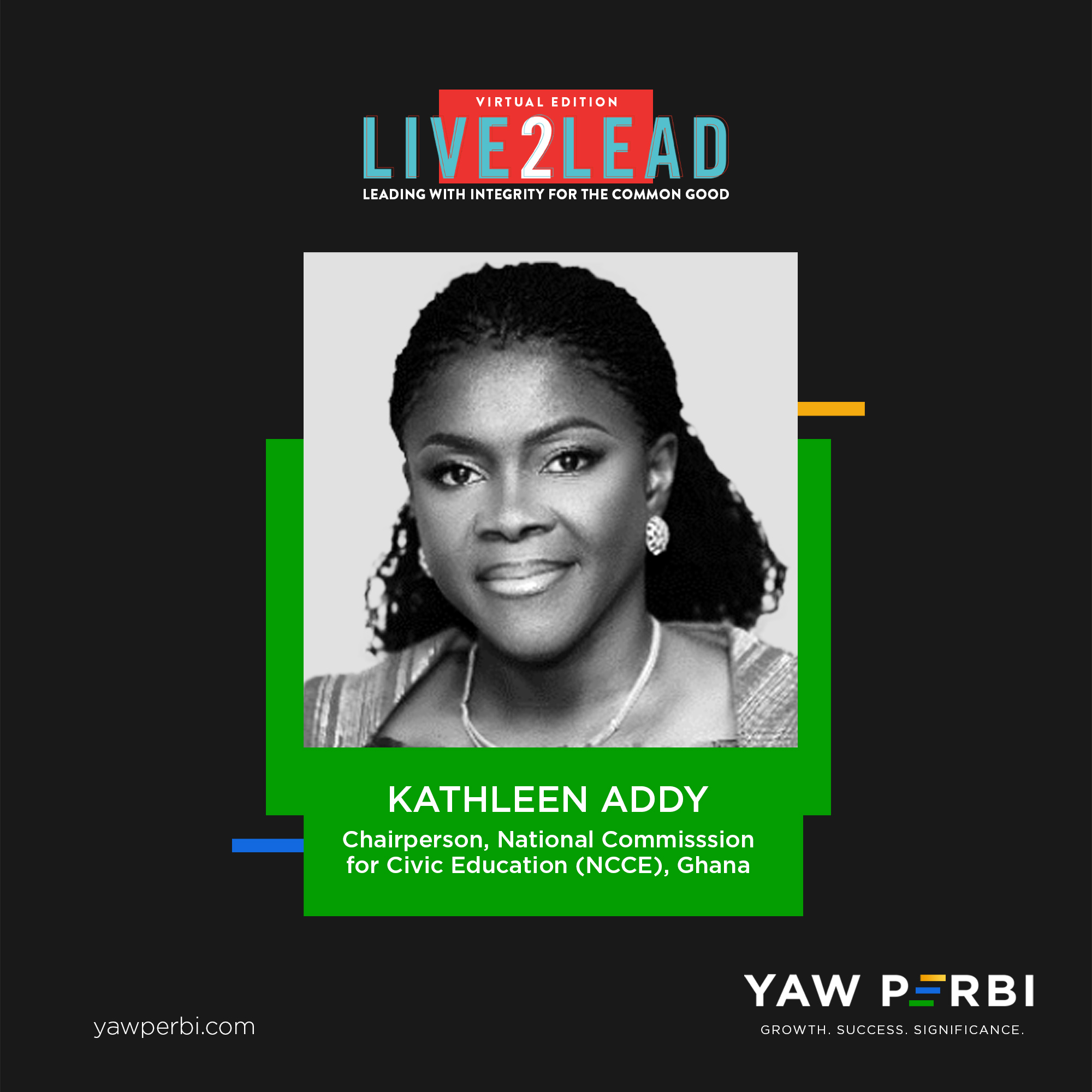
Meet Kathleen Addy, the Lady with Gravitas for Civilitas
Kathleen Addy is the Republic of Ghana’s National Commission for Civic Education (NCCE) chairperson, appointed in 2022 by the president of the Republic from her Deputy Chair of the Commission role. Ms. Addy had been in charge of Finance and Administration since 2017. Kathleen is highly regarded as a civic activist with particular interest in women’s empowerment as well as accountable and responsive governance, and has supported different civil society groups fighting for good governance and women’s rights in Ghana.
She was once upon a time a Research and Communications Officer at the Center for Policy Analysis focusing on Women’s Economic Empowerment and was the Afrobarometer Communications Manager at the Center for Democratic Development. Kathleen holds a first degree in Psychology and a Master’s in Communications from the University of Ghana, Legon. She is also an alumna of Achimota School and Holy Child School. In her role as a Chairperson of the NCCE, Ms. Addy brings her expertise and vast experience in the development sector, as well as her passion and drive to bear on the work of the commission.
Gravitas was one of the ancient Roman virtues that denoted “seriousness.” It is also translated variously as weight, dignity, and importance and connotes restraint and moral rigour. It also conveys a sense of responsibility and commitment to the task. Kathleen’s got gravitas. Meanwhile cīvīlitās, the feminine Latin word that speaks to politics and the art/practice of government, also connotes courteousness, politeness, dignity, civility, moderation, and restraint. Not only has Lady Kathy got all these, she has a passion to see every Ghanaian born of a woman possess these, and in abundance too, hence her passion for civic education.
INTEGRITY AND A NEW GHANA
At the just-held Live2Lead conference, the First Lady of Civilitas began her submissions with a chuckle, as she noted with candour how the public sector from which she hails has become the poster child for lack of integrity. She herself shared how coming from think tanks and CSOs, she got a culture shock when she first landed in the public service in 2017. “A lot of people don’t even know what the wrong thing is because wrong has been normalized,” she asserted.
But she ended with a ROAR. By the time she had shared how ‘friends and family’ who expected favours like getting an upper hand in the commission’s hiring had had a rude shock that she only gave them enough support to follow due process, the audience would doff their hats for such a principled public sector leader. We trust that the many public sector folks sponsored to attend were inspired to also lead with integrity, right in the corner where they are.
CONCLUSION
Live2Lead Ghana was wildly successful. We give glory to God. The plan to strategically rope in the public sector was a good idea and well-executed. We are grateful to all our corporate partners whose generous sponsorship made this possible, and the participation of several emerging leaders from our schools and universities. The dozen or so organizations and companies who ensured 10 or more of their leaders were present are true patrons of a Ghana that can be lead in integrity for the common good. One bank sponsored nearly 60 of their leaders, while another invested in 40 of theirs. Poco a poco, intentionality about leadership development will become a culture that rewires our nation for growth, success and significance.
God bless our homeland Ghana with gravitas for civilitas, and make our nation great and strong.
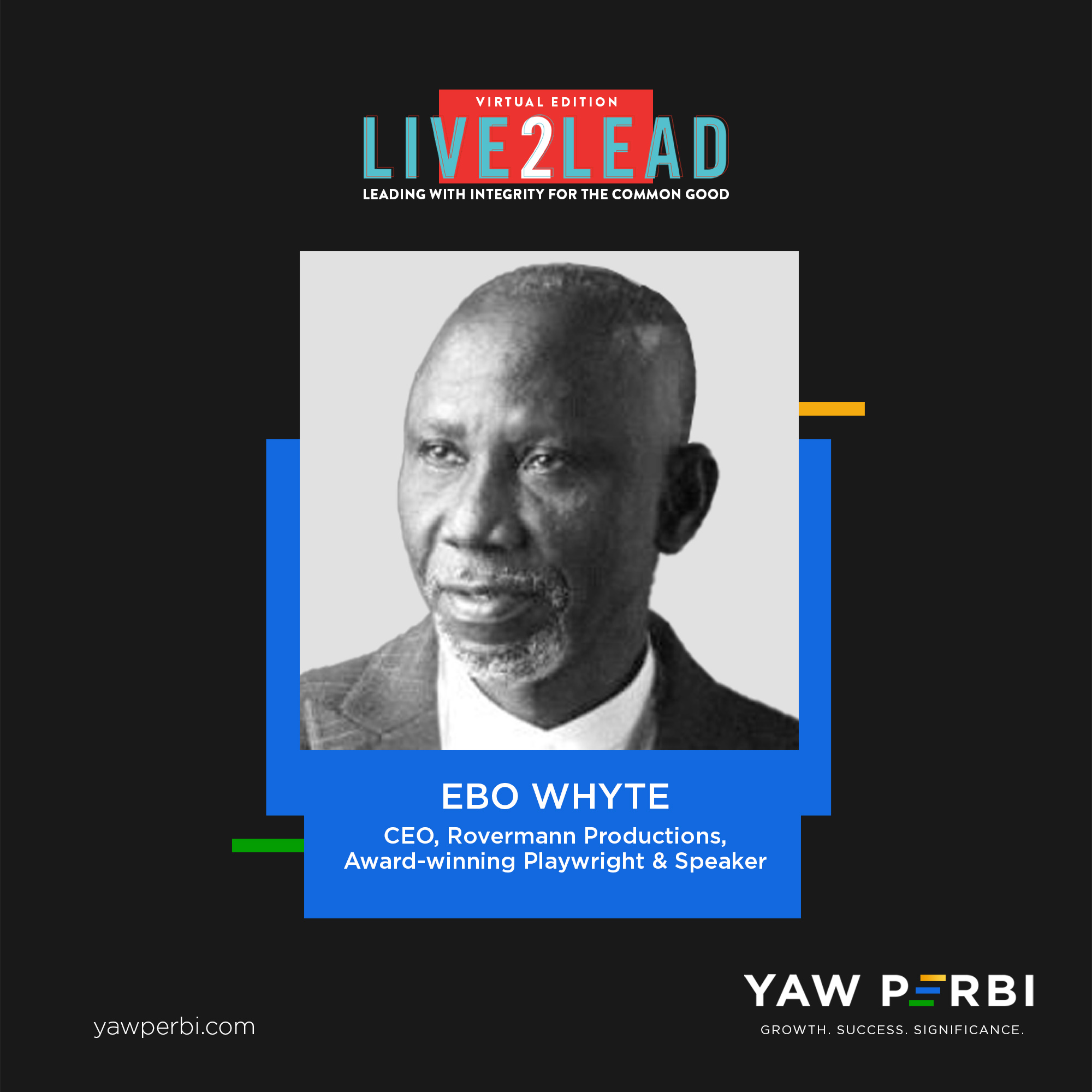
Meet Uncle Ebo, the People’s Uncle.
Everyone calls him “Uncle” without even thinking twice about it. Whether young enough to be their son or old enough to be their grandpa, “Uncle” is everyone’s uncle. A voice of reason, counsel in season, James Ebo Whyte, affectionately known nationwide as “Uncle Ebo” is the people’s uncle, hands down.
Mr. James Ebo Whyte is the CEO, heart and brain behind Roverman Productions. He is nationally acknowledged as an accomplished, award-winning playwright and highly sought-after motivational speaker. James Ebo Whyte constantly challenges Ghanaians to think more about the world they live in and the contribution they make to it. Just the day before the October 7, 2022 Live2Lead conference at which he was speaking, he unveiled to his drama troupe his 51st play in fourteen years! A hearty congratulations to the prolific playwright.
INTEGRITY IN THE ARTS & ENTERTAINMENT INDUSTRY
At Live2Lead 2022, Uncle Ebo was the only gentleman among three distinguished leading ladies from the corporate and entrepreneurship spaces as well as the public sector. Their first job was to respond to the submissions on “Leading with Integrity for the Common Good” made in the earlier hour by Patrick Awuah, founder and president of Ashesi University. Uncle Ebo held our attention as he raised issues of integrity in the arts & entertainment segment of Ghanaian society that he had with intentionality decided to counter, like giving kickbacks from corporate sponsorship. He uttered with conviction, “there are sponsorships we know we’ll never get for our plays because of this.” And he’s fine with it, as he knows that integrity comes at a cost.
One of the most amazing feats of Roverman Productions has been putting up a new play every quarter for the last decade-and-a-half and resolving to always start on time, also a matter of integrity. In fact, one of the participants at Live2Lead, a corporate governance expert, interjected that one reason she chooses to go and see Ebo Whyte’s plays is that she can guarantee they would commence on time. Again, Roverman has gone against the tide by ensuring pristine toilet facilities at their play venues and three levels of security at events to ensure patrons have a heavenly experience and leave with no bitter taste in their mouths. To the people’s uncle, excellence in these areas is a matter of integrity.
OF TEENAGE FOLLY AND GAMBLING
We intentionally wanted to leave the Live2Lead conferees on a note of hope, especially hope in Ghana, and Uncle Ebo did not disappoint. While admitting we have mega challenges in the nation he reminds us that we’ve not only been in worse times but also that in the annals of nation building globally, at 60 years Ghana is only a teenager. The national happenings that leave us in consternation are akin to teenage tantrums and this too shall pass. We do have quite a degree of national folly though, which we need to be cured of, he confesses.
Uncle Ebo’s belief in Ghana is so solid that his parting words were the following: “Whoever bets against Ghana will lose.” For a full buffet of this scintillating conversation look out for a recording of the hitherto livestreamed video (currently only available to paid participants) or invite Live2Lead to rebroadcast in your context (company, community, church etc). You don’t want to miss Live2Lead 2023 on October 6, next year, Deo volonte. Pinned on the first Friday of each October, National Leader Day after National Leader Day, building a leader at a time and one centre of excellence at a time, we shall surely get to the Ghana we want. And who knows? Perhaps sooner than other nations have.

Meet Doris Kearns Goodwin, Presidential Historian Extraordinaire
Doris Helen Kearns Goodwin is an American biographer, historian, former sports journalist, and political commentator. In 1964 Kearns received a bachelor’s degree from Colby College, Waterville, Maine, and in 1968 she earned a doctorate in government from Harvard University, where she later taught government.
Goodwin won the 1995 Pulitzer Prize in history for her No Ordinary Time: Franklin and Eleanor Roosevelt: The Home Front in World War II (1994), and in 2005 she published Team of Rivals: The Political Genius of Abraham Lincoln, which focused on Lincoln’s management of his presidential cabinet. The book served as the primary source for Steven Spielberg’s biographical film Lincoln (2012). She later wrote The Bully Pulpit: Theodore Roosevelt, William Howard Taft, and the Golden Age of Journalism (2013) and Leadership in Turbulent Times (2018). In addition to her works of presidential scholarship, Goodwin wrote Wait till Next Year: A Memoir (1997), about growing up in the 1950s and her love for the Brooklyn Dodgers. She also served as a news analyst for NBC and as a consultant for Ken Burns’s documentary Baseball (1994).
TO LEARN OR NOT TO LEARN
It breaks my heart when I hear a famous statement like, “The only thing that we learn from history is that we learn nothing from history” (Georg Hegel, German philosopher). Yet of a truth, “Those who do not learn history are doomed to repeat it.” That quote is most likely writer and philosopher George Santayana’s, and its original form read, “Those who cannot remember the past are condemned to repeat it.” While leaders must not live the past, they certainly must leverage its lessons for today and tomorrow.
Consequently, in a fireside chat with John C. Maxwell at Live2Lead on October 7 this year, Doris will share key leadership insights gleaned from her decades of experience as a presidential historian, public speaker and Pulitzer-Prize winning author. The leadership lessons learned from some of the greatest leaders in our history provide timely clues on how to navigate the current condition of the leadership deficit we are experiencing today.
Come and up your personal, professional and leadership game at this year’s Live2Lead conference. Register now through this link. Nag your organization until they join this rising movement of learning leaders that will transform society by becoming a Patron of Live2Lead. A Patron company or individual is one that sends at least 10 leaders to Live2Lead. There’s no way we can have at least 100 such Patron organizations and companies in Ghana and not transform it, one centre of excellence at a time. Together we can change our country and continent for the better! Let’s do this! Register HERE, NOW.
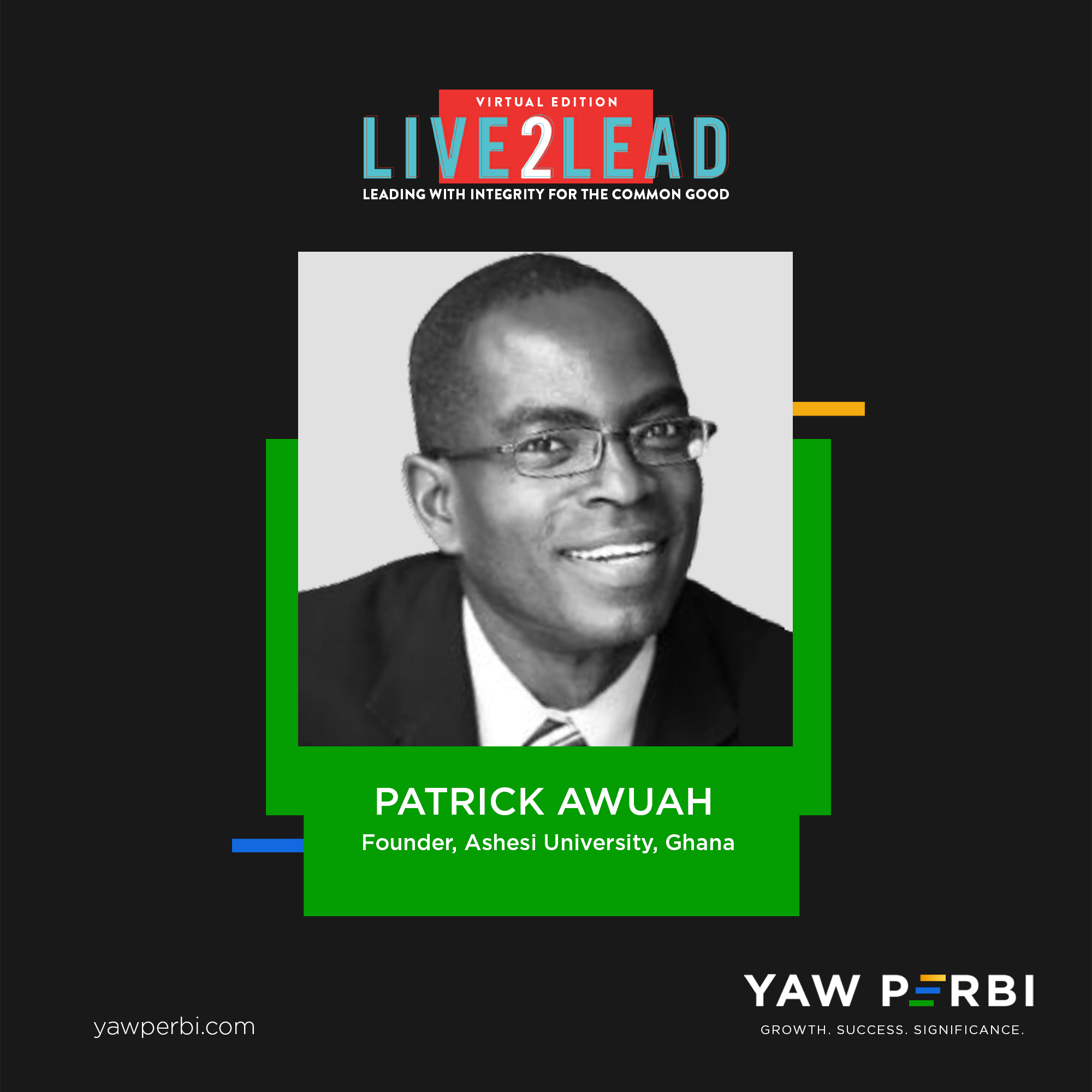
Meet Patrick Awuah, Trailblazer in International Education Brewed in an African Pot
Last Friday, I spent some time with friend, mentor and fellow African Leadership Initiative/Aspen Global Leadership Network Fellow, Patrick Awuah Jr. It was a joy to see and hear afresh his commitment to the cause of leadership development on the continent of Africa. And this personal pledge is to the extent that he will be excusing himself from a crucial Ashesi University board meeting to address the leaders virtually gathered at Live2Lead and then dive right back into the governance matters of this leading African establishment.
Patrick Awuah is a Ghanaian engineer, educator, and entrepreneur. Patrick founded Ashesi University in 2002. Dr. Awuah, with three honorary doctorates (Swarthmore College 2004, Babson College 2013, University of Waterloo 2018) to his name, has won numerous other awards as an individual and as the founder of Ashesi University. He was presented with the Order of the Volta Award to recognize his contribution to tertiary education in Ghana in 2007. In 2009, Awuah won the John P. McNulty Prize. In 2010, Awuah was awarded 87th most creative businessperson by Fast Company. In 2014, he received The Elise and Walter A. Haas International Award, which honours UC Berkeley alumni with distinguished records of service to their native country. In the same year, he was named best social entrepreneur by the Schwab Foundation for Social Entrepreneurship. In 2015, Awuah was listed by Fortune as number 40 in world’s 50 greatest leaders and was awarded a MacArthur Fellowship. In 2017, Awuah was awarded the World Innovation Summit for Education (WISE) prize, a major global education award.
INTEGRITY IN LEADERSHIP FOR THE COMMON GOOD
”INTEGRITY” is an often-used but little understood (and even less practiced) word in Ghana today. Patrick will be the keynote speaker on the theme for this year’s Live2Lead, “Leading with Integrity for the Common Good.” Ashesi has a fascinating story about an honour code and how its implementation nearly jeopardized Ashesi’s accreditation process. This tale has everything to do with instilling integrity, and for those of you who are not privy to the terrific tale, we shall be impressing upon Patrick to share “from the horse’s own mouth.”
Patrick will address what integrity actually means and share practical examples where he’s led with integrity and times his integrity has been challenged. Dr. Awuah will practically tip all and sundry on how integrity is taken off the wall and printed in hearts and minds on four levels: (1) personally (2) as teams (3) organisation-wide and (4) nationally.
You don’t want to miss Patrick Awuah’s fireside chat session at Live2Lead Ghana 2022. Grab your seat right here right now.

Raise the Roof, Lift your Lid!
I just arrived at my room in Cape Town after three flights from Accra to Nairobi, Nairobi to Johannesburg and Jo’burg to Cape Town. A question on my mind as l flew here far above sea level, sometimes as high as 38,000 feet, has been, “How high is your leadership lid?”
THE FIRST OF THE IRREFUTABLE LAWS OF LEADERSHIP
Of course you know what a lid is, the cover of a container. How high your lid is determines the quality of the leadership that you provide for those you lead. I learnt this a long time ago, some 20-25 years ago from John Maxwell’s 21 Irrefutable Laws of Leadership. It was the very first of the principles of leadership he espoused in that bestseller and my life has never been the same since.
As John challenged me then from the written word—and many years later in-person—I must always endeavour to lift my leadership lid because no family, organization, church, community or country would ever grow past their leader. The leader is the lid over those (s)he leads. Sometimes when training leaders I ask, “are you a leader or ‘lidder’? because a leader is literally the lid on the progress and prosperity of their constituency. In a sense, every leader is a lidder; the question is “how high?”
IMAGINE THIS PRESIDENTIAL LID
You probably have heard me tell the story of a certain African president that a group of us, Maxwell certified leaders, were trying to connect in-person to John C. Maxwell for a national transformation process and programme. This president had never heard of John. In all probability, he hadn’t read any other contemporary leadership experts but hopefully he has digested at the very minimum some of the leadership classics like Plato’s, ‘The Republic’. It is a scary thought that this African nation—and by extension every family, organization, corporation, community, church etc. within her—would be constrained by the tightness of this head of state’s lid. I almost added, “through no fault of theirs,” but I guess they voted him into power.
HOW TO LIFT YOURS
While we educate a new generation that should be too enlightened to allow such tight lidders to lead African nations in the next decade, let me ask you, let’s get personal: how high is your lid? We forget, many of us (or we might even not know), that leadership is not just caught, it must be taught. And that’s why I love the opportunity, come October 07, for us all to be part of a life-altering, lid-lifting Live2Lead virtual experience with local faculty and global ones beaming all the way from Atlanta, Georgia.
We are gunning for 2,000 leaders—from emerging (youth) leaders, through leaders in the establishment (i.e. government/public sector leaders) to established leaders in the private sector, including executives from the corporate space. We will be taught in word and deed by powerful speakers and shakers like John C. Maxwell himself, two Patricks (Lencioni of the USA and Awuah of Ghana) and a Patricia (CEO of Vodafone, Ghana).
RAISE THE ROOF!
One of the most powerful discoveries in psychology over the last generation has been that people can learn and grow and change! So wherever your lid is today, if you learn to lead better you provide more room for those you lead. John will be the first to tell you that “your capacity determines your impact.”
Perhaps, some of the conflicts you are experiencing right now in your organization, church or wherever you lead is because your lid is too low and so people keep hitting it. And there is going to be continued tension and banging (conflict) till at some either you leave the stage or your people take their exit. As you have probably heard it said, people join organizations but they leave people (managers/leaders). It’s time to make room, lift your lid, raise the roof!
I have been part of things l left because the lid was too low. It just wasn’t life giving and l know people have also left my leadership when my lid was low because it was just too tight. Learn to lead. Each one of us can learn to lead better. Blow off the lid so that all of a sudden the people under your leadership feel this space and freedom because you lifted your lid and now they can breathe and create and innovate and… live again.
Join us at Live2Lead Ghana 2022, on October 7, and let’s all learn to lead better so that the people following our leadership can live better. If leading is your purpose on earth—that you live2lead—then you might as well as learn2lead, and do it well. As Donewell Insurance puts it, “If it must be done, it must be done well.” If we must lead, then we must lead well. Let’s blow off some lids and see our constituents blessed beyond measure, growing great and strong.
Right outside my hotel room window is the breathtaking view of the majestic, towering Table Mountain at 3,500 feet above sea level with no real ‘peak’ per se. No lid! So in the meantime, while you contemplate your lid, I will enjoy Cape Town on your behalf.
Post Script
Register and join LivetoLead here.
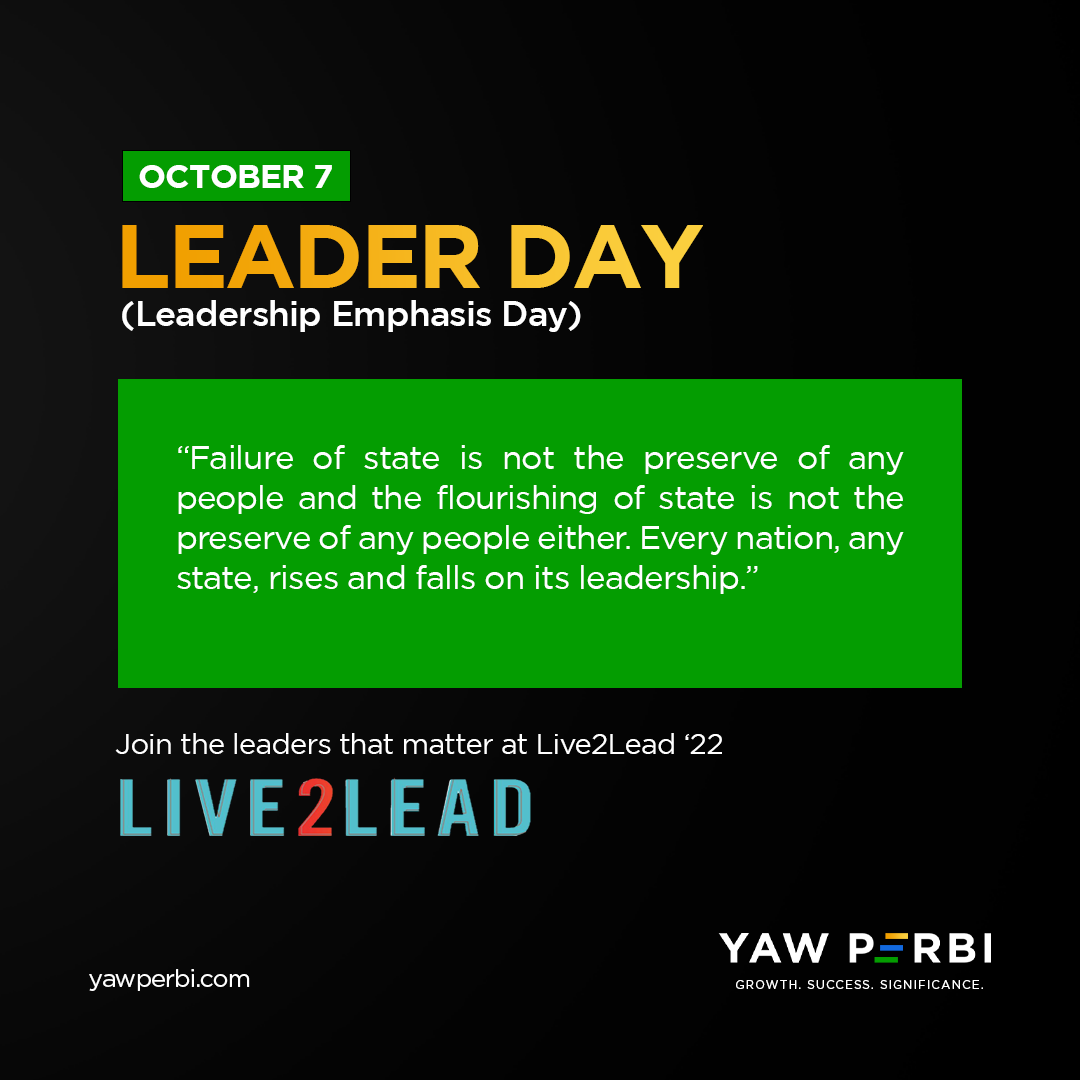
Of Principles, Principals & Principalities
This is a true story: A few years ago, a handful of us John Maxwell-certified coaches and trainers from Africa were trying our possible best to get John, the world-famous leadership expert, to visit a particular African country and engage their president. A good number of Maxwell-certified leaders have been travelling with John to specific developing countries to engage them in a bottom-up transformation process that have done these nations some real good and we hoped same for this African nation with great potential. But John doesn’t come cheap. In fact, one of us was serious enough about this that he cashed in part of his 401k (retirement savings in the U.S.) to make this trip possible. It was such a struggle to gain access to the president, like pulling teeth! Eventually we did. To my ‘shock and awe’ (just remembering U.S. President Bush Jnr.), this African president did not even know of John Maxwell! That is when I knew the country wouldn’t do well. And I was right.
LEADERSHIP IS THE TIDE
Over the last few years, especially with the Trump presidency and with the advent of social media proliferation, many of us have seen parts of the United States that we have never seen before. Horrible parts and horrific things—whether it is the wicked knee of a policeman on George Floyd’s neck or violent street protests or the infamous January 6 ‘insurrection’ or whatever it is. We had all this exposure to things we could not hitherto have imagined occurring in the ‘greatest nation in the world.’ At the peak of these happenings, during the Coronavirus pandemic, I frantically tried (see January 2021 article) to get some of my American friends to appreciate that Africans are no less human or merely more stupid than they are, and that if there is a difference between their economic status and my motherland’s it was just because, “everything rises and falls on leadership.” Leadership is the tide the raises all the other boats in a society (or otherwise). Most of them, I perceived, didn’t still quite get me.
AFRICA IS NOT THE PROBLEM
Just like we’ve seen in the last few years in America, we’ve also seen in several countries in Europe how “leadership is cause; everything else is effect.” I’ve lost count of how many Prime Ministers Britain has had in the last little while, and we all witnessed with horror the leadership (or the lack thereof) of the last one with the Russian first name. Africa is not the problem, leadership is. Failure of state is not the sole preserve of any nation neither is the flourishing of state the preserve of any nation. Every nation, any nation, rises and falls on its leadership.
“WE THREE KINGS”
These three kings are at work in nation building: Principles, Principals and Principalities. If you like, these actors are Laws, Leaders and Luciferites. Principles are neutral, Principals are supposed to be working for their people while Principalities are against. There are principles that touch on every aspect of life, including leadership. When these principles or laws–which are timeless, universal truths–are lived out, nations do well, families flourish, churches and organizations prosper. When they are broken we don’t.
It is easier to appreciate the physical and chemical principles because we can see and feel and touch them and their consequences. The Law of Gravity is the commonest example of a principle of Physics (physical law). There are leadership principles as well. Many of these are intangible in their operation but produce very tangible effects reflected in socioeconomic and other indices. Nations that live by principles, these consequential laws of the universe that make this world run properly, prosper and nations that do not live by principles don’t. The nations whose principals (leaders) live by these principles prosper; those that don’t do not suffer. It bears repeating that this applies to families, communities, churches, organizations… you name it.
WHERE DEMONS COME IN
Of course, those of us who believe in spiritual things know that over every nation and territory there are also what we call Principalities (Lucifer’s forces). These ‘Luciferites’ (I call them), are spirits that have territorial control that want to oppress nations and not let them come to their full manifestation. Why, you may ask? Out of envy of humans and out of spite for their Creator. But guess what? If you have principals (leaders) who live by principles (laws), including spiritual principles on how to deal with these powers, those nations, those families, communities, churches, organizations and countries of such leaders would bloom.
STOP THE BLAME GAME, NOW
Africans! let’s stop blaming how socioeconomically bereft we are on Principalities. It is our lack of following Principles—all of us—and particularly the lack of our principals leading in a principle-based manner as they should that has landed us where we are. We have an opportunity on October 7, all of us, to learn more of these principles as principals, whether we are executives in companies, pastors of churches, student leaders, public sector actors or whatever. We must all learn to lead better. When the leader gets better everything everyone else gets better.
It’s time to take on the principalities (Lucifer’s powers) that are oppressing and not making us prosper as nations and communities and it would come from the principals (leaders) who would live by the principles (laws) of leadership and lead the rest of us to do same. Don’t blame the principalities—and you can’t blame the principles either—it all lies on the principals. Principles are fundamental laws that cannot be changed and must be lived by to prosper. Principalities are spiritual powers that can be challenged to let things “be on earth as it is in heaven.” Neither principles nor principalities are respecter of persons, whether principal or peasant. Nations with great principals (leaders) abide by principles (laws) and defy spiritual principalities (Luciferites) to make their nations prosper. How laudable is your leadership?
Remember the nation whose principal-in-chief was clueless about leadership principles, at least as taught by Maxwell? I feel sorry for his people as I see and hear of their plight each day, worsened by the Coronavirus invasion of our planet. It’s not the devil; it’s our leaders. As one medical colleague pursuing Paediatric Pulmonology in South Africa poignantly commented on my PEP Talk on YouTube about this matter, “Once our Principals follow Principles and we the led are inspired, we will be too busy prospering to blame Principalities.” Enough said. Are our principals hearing?


